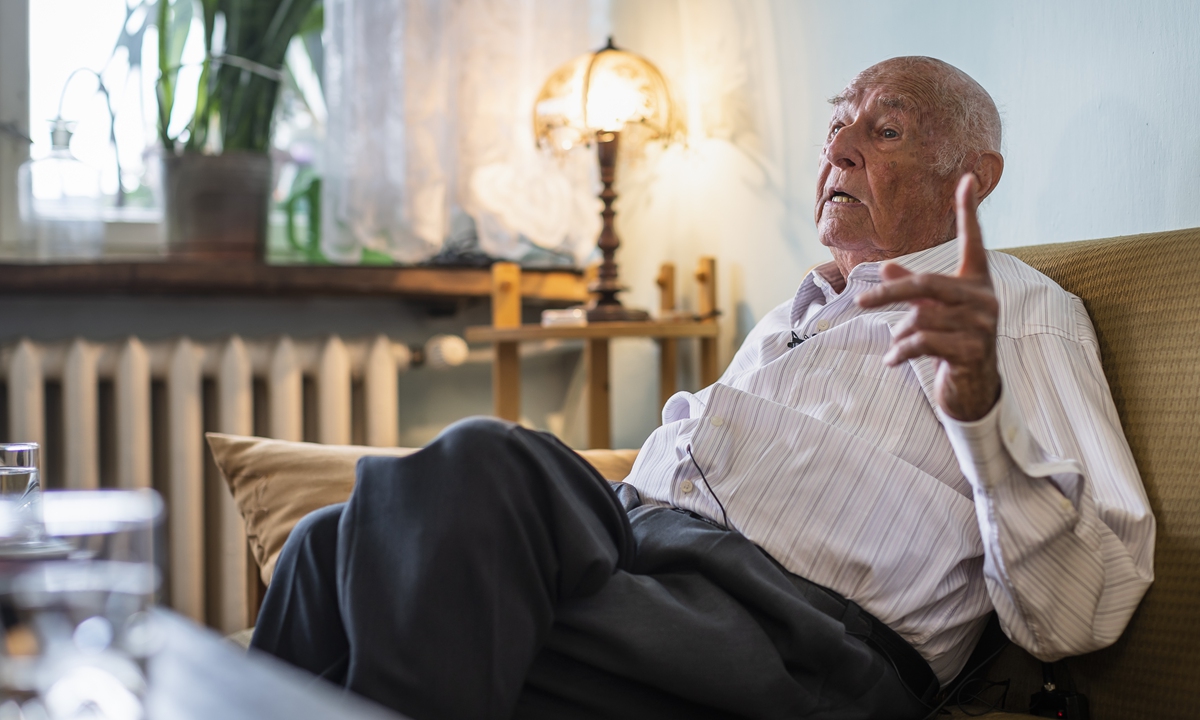Witness in SS guard’s trial speaks out to prevent history from repeating itself
Source: AFP Published: 2020/7/23 16:13:40

Marek Dunin-Wasowicz Photo: AFP
The pyres of burning bodies in the forests around Nazi Germany's Stutthof concentration camp still haunt 93-year-old Marek Dunin-Wasowicz, a crucial witness in the trial of former SS guard Bruno Dey which is expected to close on Thursday.
For Dunin-Wasowicz, who spent several months in the camp aged 17 after being arrested as a suspected member of the Polish resistance, the trial in Hamburg was never simply about a judgment establishing Dey's guilt or innocence.
"Whether it was indirectly or directly, he took part in murder. He was a criminal," the former journalist and author told AFP in an interview at his Warsaw apartment in July, gripping his walking cane as he recounted the horrors of the camp.
Dunin-Wasowicz said he felt "indifferent" about Dey and does not want revenge or an apology.
But he decided to become a co-plaintiff in the trial - perhaps one of the last ever for Nazi crimes - because he felt "honor-bound" to speak out for the more than 60,000 people killed at the camp and for the few survivors who are still alive.
Dunin-Wasowicz also wanted his testimony to be heard in Germany, the country where Nazism originated and at a time of rising far-right rhetoric in Europe.
"We don't want that time to be reborn," he said.
'He knew what was going on'
Dunin-Wasowicz arrived at the camp on the Baltic coast in occupied Poland in May 1944 and escaped in February 1945.
He does not remember Dey but archives show the guard served there at the same time and was the same age - the reason why he is being tried in a juvenile court.
During the trial, Dey has claimed that he had no direct involvement in mistreating prisoners because he was standing guard in a watchtower the whole time.
But Dunin-Wasowicz told the trial that SS guards like Dey would also escort prisoners to the gas chambers and oversee inmates working outside the camp - sometimes watching them being beaten by fellow prisoners called kapos who were given oversight duties.
The prosecution argues Dey is guilty because he was part of the Nazi killing machine.
A landmark 2011 ruling against former camp guard John Demjanjuk established the legal precedent for such prosecutions. Germany has since been racing to put on trial surviving SS personnel on those grounds rather than atrocities directly linked to them.
Dunin-Wasowicz rejected Dey's assertion that he had no choice, although he admits he does not know what he would have done in his place since the most obvious alternative to serving at the camp would have been to fight on the Eastern Front.
"He knew what was going on there. He didn't have to do it," he said, calling Germany's long delay in bringing Nazi personnel like Dey to justice "inexcusable."
'The crematorium couldn't keep up'
Stutthof was set up initially to imprison Polish leaders and intelligentsia in September 1939 at the outset of the war and was the first Nazi camp to be built outside Germany.
It was also the last camp to be liberated by the Allies at the end of the war in May 1945.
Dunin-Wasowicz remembers being pleasantly surprised when he arrived for the first time after a journey on a freight train with some 900 other men. As they approached the camp, there were beautiful flowers, a colorful fence and swans swimming in the pond.
"Paradise!" he remembers thinking before the men crossed through an entrance into the camp that he later found out was known as the "Gate of Death."
By the time he arrived, the concentration camp was turning into an extermination camp, part of the Nazi plan to systematically eliminate European Jews.
Dunin-Wasowicz was stripped, dressed in a prison uniform with wooden clogs and given a number - 35,461 - "a number that will follow me to the end of my life."
Once he had settled into camp life, a friendly doctor advised him to get out of hard labor by crushing his toe, confining him to the camp hospital for long stints.
From a window at the hospital he could see the camp's gas chamber and crematorium.
He remembers seeing "silhouettes" of people walking toward the gas chamber, undressing before entering and later some prisoners who "hauled out the corpses."
"The crematorium couldn't keep up with the cremations, so they started to burn corpses on pyres outside the camp" shortly before its liquidation, Dunin-Wasowicz said.
'They never got back up'
In January 1945, he remembers hearing the first sounds of artillery. The frontline was moving close to the camp. It was evacuated and some of the inmates were forced to join a march under SS escort, crossing fields knee-deep in snow.
"Whoever couldn't keep up, whoever didn't have any more strength and collapsed, they never got back up because the last SS men used their rifles to kill off the fallen," he said.
After trudging along for two weeks, he and his brother simply made a run for it.
Dunin-Wasowicz said he now feels a "difficult and painful need" to speak out after all this time to counter "fascism, neo-fascism and all the other evils that had as a consequence Hitlerism and the concentration camps."
Newspaper headline: Sounding a warning
Posted in: TV,CULTURE & LEISURE,ARTS FOCUS